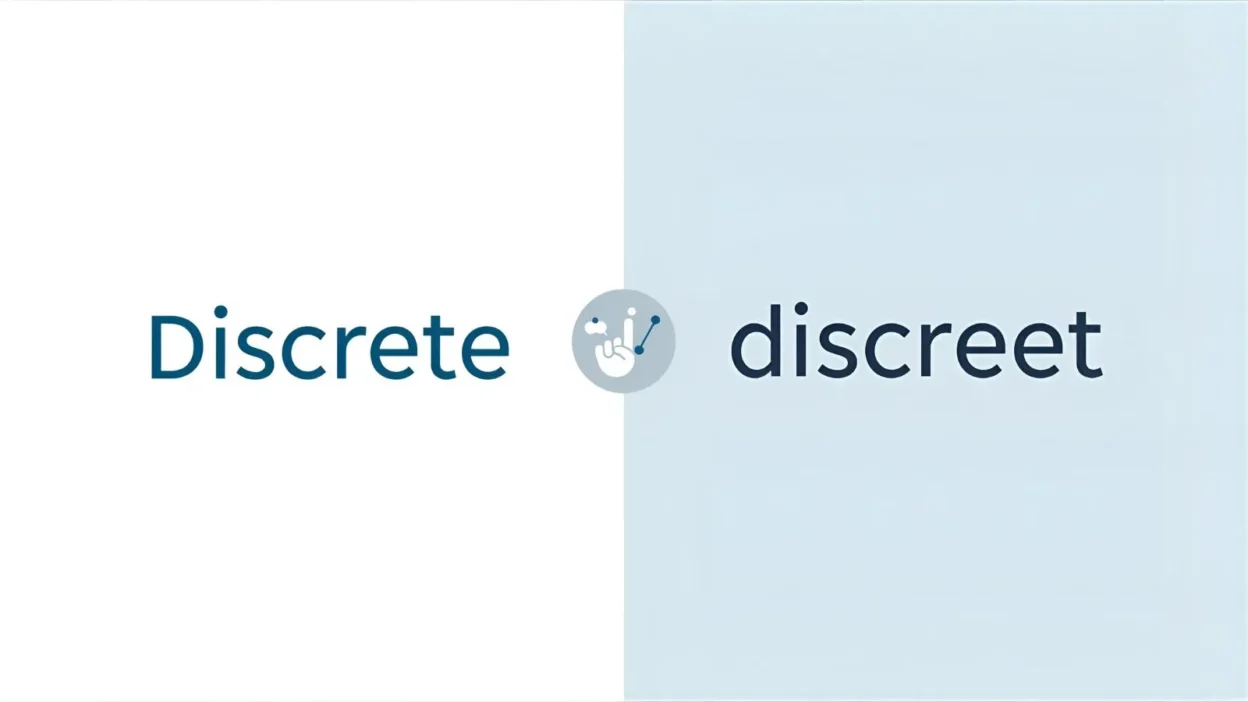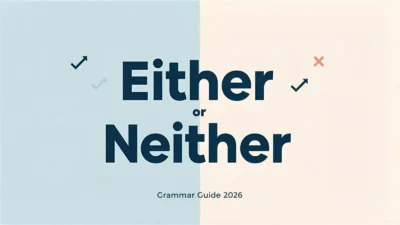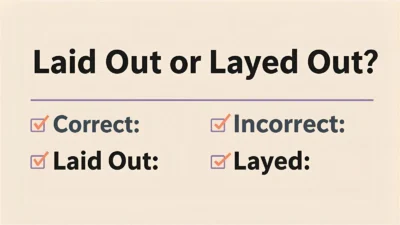Have you ever written “discreet” when you actually meant “discrete”—or vice versa—and wondered if anyone noticed? You’re not alone.
If you’re a student, professional writer, or English learner, this tiny spelling mix-up can completely change your sentence’s meaning. The words discrete and discreet sound the same but mean very different things, and that’s exactly why so many people search for them online.
In this quick, clear guide, you’ll finally learn the difference, how to remember it easily, and how to use each word correctly in your writing, emails, or conversations.
Discrete or Discreet – Quick Answer
The short answer:
- Discrete means separate, distinct, or individual.
👉 Example: “The company has three discrete departments.” - Discreet means careful, private, or showing good judgment.
👉 Example: “Please be discreet when discussing this issue.”
Tip: Remember — “discrete” has a break (“cre”), which can remind you of separate parts. “Discreet” has double “e,” like “eyes,” reminding you to be watchful or careful.
| Word | Meaning | Example Sentence |
|---|---|---|
| Discrete | Separate or distinct | “The data is divided into discrete categories.” |
| Discreet | Careful and private | “He was discreet about his personal life.” |
The Origin of “Discrete” and “Discreet”
Both words come from the Latin word “discretus,” meaning separated or distinguished.
In Middle English, the meanings started to split:
- Discrete kept the idea of being distinct or separate.
- Discreet evolved to mean showing discernment or careful judgment.
So, historically, they share a root but diverged in meaning due to evolving context and pronunciation. That’s why they still sound alike but carry different senses in modern English.
British English vs American English Spelling
There’s no difference in spelling between British and American English for these words. However, usage frequency can vary slightly by region.
| Variety | “Discrete” Usage | “Discreet” Usage | Example |
|---|---|---|---|
| American English | Often in math, science, and tech | Common in business and social talk | “A discrete variable” / “A discreet conversation” |
| British English | Same usage, slightly more in academic texts | Same usage, often in formal writing | “Discrete units of sound” / “Be discreet with colleagues” |
So, whether you’re in the US, UK, or elsewhere, the spellings remain identical, only context changes slightly.
Which Spelling Should You Use?
It depends on your topic and audience:
- ✅ Use “discrete” for technical, scientific, or analytical contexts — when referring to separate items or elements.
Example: “Discrete data points show individual values.” - ✅ Use “discreet” for personal, private, or sensitive contexts — when referring to careful behavior or privacy.
Example: “Please be discreet about this meeting.”
Audience guide:
| Audience | Correct Word | Example |
|---|---|---|
| Tech / Science | Discrete | “Discrete systems in computing.” |
| Business / HR | Discreet | “We expect employees to be discreet with information.” |
| Academic | Discrete | “Discrete mathematics is essential in computer science.” |
| Personal Writing | Discreet | “She was discreet about her emotions.” |
Common Mistakes with “Discrete” and “Discreet”
Here are frequent mix-ups and how to fix them:
| Mistake | Why It’s Wrong | Correct Form |
|---|---|---|
| “He was discrete about his finances.” | “Discrete” means separate, not private. | “He was discreet about his finances.” |
| “The company has discreet teams.” | “Discreet” means careful, not distinct. | “The company has discrete teams.” |
| “I need discrete advice.” | You can’t separate advice; it’s about confidentiality. | “I need discreet advice.” |
Quick Trick:
If it’s about privacy → discreet.
If it’s about parts → discrete.
“Discrete” and “Discreet” in Everyday Examples
| Context | Example Sentence |
|---|---|
| “Let’s keep this discussion discreet.” | |
| News Article | “The data was split into discrete groups.” |
| Social Media | “I admire how discreet she is about her personal life.” |
| Formal Writing | “Discrete signals are essential in digital communication.” |
| Conversation | “He was very discreet when handling the issue.” |
Notice how “discrete” fits technical tone, while “discreet” fits social or personal tone.
“Discrete or Discreet” – Google Trends & Usage Data
According to Google Trends:
- “Discreet” is searched more often worldwide.
- “Discrete” dominates searches in academic and technical contexts.
- Top countries searching “discrete or discreet”:
🇺🇸 United States, 🇬🇧 United Kingdom, 🇨🇦 Canada, 🇦🇺 Australia, 🇮🇳 India.
This shows people everywhere are confused by these twin words — especially non-native speakers and students in science or business communication.
FAQs
1. Is “discrete” the same as “discreet”?
No. They sound alike but have completely different meanings.
2. Can “discreet” mean separate?
No. “Discreet” means private or careful. “Discrete” means separate.
3. How do I remember the difference?
Think: “Discreet = Secret” (both have double “e”).
4. Is “discreet” formal?
Yes, it’s often used in formal or respectful communication.
5. What is “discrete data”?
In math or science, it means data that can be counted individually, like 1, 2, 3…
6. What is “discreet behavior”?
It’s behavior that’s tactful, private, or modest.
7. Are both correct in British and American English?
Yes — same spelling and meaning across both versions.
Conclusion
“Discrete” and “discreet” may look and sound similar, but their meanings couldn’t be more different.
Use “discrete” when referring to distinct parts or elements — perfect for science, math, or structured writing.
Use “discreet” when referring to private, careful, or tactful behavior — ideal for personal, professional, or diplomatic writing.
By remembering this simple rule — discreet keeps secrets; discrete separates things — you’ll never confuse them again. Choose the right one depending on your context and audience to sound precise, clear, and confident.

I’m Emma Collins, a grammar expert and author at Grammarnestly.com. I love helping readers master English with simple, practical grammar guides.
When I’m not writing, I enjoy reading, coffee, and exploring the beauty of language.



